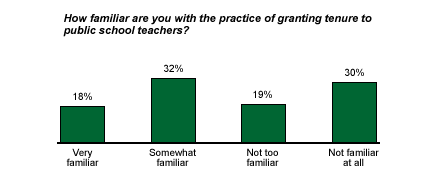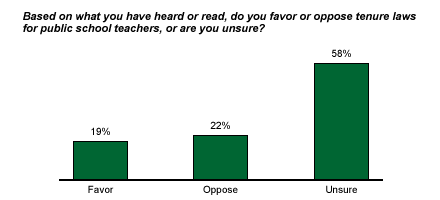Among the ballot issues Californians will vote on in Tuesday's special election is whether to extend the probationary period before public school teachers become tenured from two to five years. If Proposition 74 -- also known as the "Put the Kids First" initiative -- passes, California would become the third state to require a five-year trial period. A majority of states require three-year periods. Under California's initiative, it would also be easier for schools to fire tenured public school teachers after two consecutive "unsatisfactory" performance reviews.
A recent Gallup Poll* asked about the issue of teacher tenure. Only half of Americans are at least somewhat familiar with the practice of granting tenure -- or permanent status -- to public school teachers.

Respondents who currently have children enrolled in public schools are no more likely to be familiar with the policy of teacher tenure than are those with no children in grades kindergarten through 12. But acquaintance with the policy does vary by level of respondent education. Just 32% of Americans with a high school education or less are very or somewhat familiar with the practice, compared with 79% of those with a postgraduate education, 61% of college graduates, and 56% of Americans who have had at least some college.
Tenure-track positions are often coveted by professors at colleges and universities, which may be why familiarity is skewed toward Americans with higher education. Fred Glass, director of communications for the California Federation of Teachers, isn't surprised that many Americans are unfamiliar with the concept of tenure. "They've had far fewer opportunities to get to know and talk to educators," he says.
Tenure Pros and Cons
Gallup asked Americans whether they favor the practice of tenure for public school teachers. The majority, 58%, do not have an opinion. Among those who do, opinion is fairly evenly divided -- 19% of Americans say they favor tenure and 22% oppose it.

Among the roughly 20% of Americans who are "very familiar" with the practice of tenure, 44% are in favor, 40% are opposed, and 16% have no opinion.
Those in favor, including teacher unions and state school board associations, have long held that tenure is necessary to protect teachers from dismissals based on unpopular opinions, arbitrary administrations, or simply the ebb and flow of cultural tides. "I'm in favor of job security for all types of work, including teaching," says Todd, a 45-year-old respondent from Maine who is "somewhat familiar" with tenure and likes what he sees. "Teachers put in a lot of time and they deserve to know their job will always be there."
Others feel granting tenure too often encourages teachers to become complacent about the quality of their work -- or worse, keeps bad teachers in the classroom far too long. "I can understand why teachers want tenure," says Betty, a 73-year-old respondent from Michigan. "We have a lot of good teachers, but some bad ones, too -- teachers who just put in their time. They know they can't be fired so they don't really care about the kids. It should be much easier to get rid of the bad apples and just keep the good ones."
Bottom Line
Tenure is a complex issue, even apart from the fact that specific tenure policies vary from state to state, so it's not surprising many Americans say they are not really familiar with it. It also affects only a small segment of the population. Many may be unclear as to just what rights tenured teachers have, or whether they can ever be fired.
Glass points out that tenured teachers can be fired -- at least in his state. "Tenure is not a job for life," he says. "In California, it is simply the right to a hearing before being fired, during which reasons for termination must be presented. According to our attorney, 99% of cases in which a teacher should be fired but is not, it's because the administration has not documented the grievance properly -- it's not the fault of tenure or the teacher's union."
Whether Proposition 74 passes -- or is defeated, as Glass and his union hopes -- Elizabeth, a 41-year-old respondent from Missouri, sums up a middle position that would probably sit well with many Americans. "Experience is important," she says, "and tenure is one way to reward experience. However, there has to be a system of due process, checks, and balances so that teachers can be fired -- just not too easily."
*Results are based on telephone interviews with 1,001 national adults, aged 18 and older, conducted Aug. 8-11, 2005. For results based on the total sample of national adults, one can say with 95% confidence that the margin of sampling error is ±3 percentage points.
